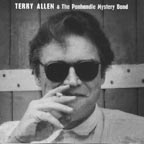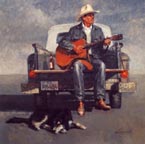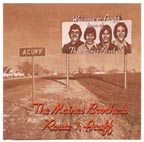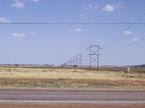Fire in the Water, Earth in the Air: Legends
of West Texas Music
by Christopher Oglesby
Published by the University
of Texas Press:
"As a whole, the interviews create
a portrait not only of Lubbock's musicians and artists, but also
of the musical community that has sustained them, including venues
such as the legendary Cotton Club and the original Stubb's Barbecue.
This kaleidoscopic portrait of the West Texas music scene gets
to the heart of what it takes to create art in an isolated, often
inhospitable environment. As Oglesby says, "Necessity is
the mother of creation. Lubbock needed beauty, poetry, humor,
and it needed to get up and shake its communal ass a bit or go
mad from loneliness and boredom; so Lubbock created the amazing
likes of Jimmie Dale Gilmore, Butch Hancock, Terry Allen, and
Joe Ely."
"Indeed, Oglesby's introduction of more
than two dozen musicians who called Lubbock home should be required
reading not only for music fans, but for Lubbock residents and
anyone thinking about moving here. On these pages, music becomes
a part of Lubbock's living history."
- William Kerns, Lubbock Avalanche Journal
|
Chris Oglesby Interviews
TERRY ALLEN
above The
Caravan of Dreams, Ft. Worth
Ft. Worth: 3/26/98
It was remarkably appropriate that I was meeting
Terry Allen at a place  called
The Caravan of Dreams...This whole story seems to be about dreams;
Dreams and interpreting them. called
The Caravan of Dreams...This whole story seems to be about dreams;
Dreams and interpreting them.
It seemed like a dream, driving from Austin to Ft. Worth.
I was completely zonked out on the road, mostly because I had
gone out to Antone's the night before to see Joe Ely which
provided a delerious segue into my trip to see Terry Allen this
night.
I don't know how it happened because I don't think I really had
too much to drink, but I do remember that one "Turkey"
shot, and that's probably what did it. And of course, I had danced
like a Sufi that night before. So I was beat bad the whole drive
up IH-35 and was in somewhat of a dreamy state, anyway. I remember
praying to the spirit of Neal Cassady, hoping that if anyone could
get me up the road that afternoon, it was Neal, a.k.a. Dean Moriarity.
So it came to pass, with the various Lords of the Highway driving
me on, my dilapidated silver '91 Celica -- which I called the
Burro -- and I finally made it to Cowtown.
The Caravan of Dreams was a fantastic live music venue in Old
Downtown Ft. Worth. The place originally had been built as a
jazz club by one of the old Ft. Worth oil families. From my notes:
"Beautiful brass fixtures, great stage jutting out into
the audience area which is comprised of small round cocktail
tables and red (cherry?) wood chairs; a remarkably dreamy mural
depicting such scenes as people fighting and dying in war, planets,
the center has a skyscraper with rockets on either side, there
are strange almost inhuman faces on the far right; amongst it
all is shown a big swing band and an audience. The Grotto
Bar on the roof is the most amazing part. There is a virtual
Hanging Garden of Babylon up there: Glassed in terrarium area
with waterfall, more cocktail tables in the open air, and Bar,
great view of the city at night; Pictures on the staircase wall
of all the acts that have played there over the years. Quite
a dreamy venue."
Lloyd Maines,
pedal steel-guitar player extraordinaire and top Texas music
producer, had ripped it up at Antone's in Austin the night before
with the Joe Ely Band, and here Lloyd was in Ft. Worth warming
up for his part in Terry Allen's Panhandle Mystery Band.
He saw me there in the audience in the afternoon watching him
lead the sound check. I reminded him that we had met several
times when I worked at the Driskill Hotel; I always got him his
favorite room with the balcony facing east down 6th Street.
My friend Richard
Bowden, the fiddler for the PMB, had arranged my meeting
with Terry. Richard was sitting alone at a table in the audience
area, waiting for rehearsal. He explained to Lloyd that I was
exploring the "Lubbock-creativity" phenomena. Richard
took that opportunity to reiterate his own pet theory about it
being caused by "the flying saucers," the well-documented
Lubbock Lights which were seen and photographed
by Tech professors back in the 'Fifties.
Lloyd responded with, "I think I agree with what that ol'
Paul
Milosovich painting  has
to say about it: Nothing Else To Do." has
to say about it: Nothing Else To Do."
As he does the sound check, Lloyd recites, standing at the
microphone and occassionally strumming his acoustic guitar:
...I believe that to live and work on a
good farm, or to be engaged in other agricultural pursuits, is
pleasant as well as challenging; for I know the joys and discomforts
of agricultural life and hold an inborn fondness for those associations
which even in hours of discouragement, I cannot deny...
[Occasionally,
Lloyd breaks with a "check...check..."]
I believe in leadership from ourselves
and respect from others. I believe in my own ability to work
efficiently and think clearly, with such knowledge and skill
as I can secure...
[check,
check...]
I believe...in the life abundant and enough honest wealth to
help make it so--for others as well as myself... in being happy
myself and playing square with those whose happiness depends
upon me."
"That's from the creed of the Future Farmers of America,"
Lloyd explains at he steps from the stage.
Lloyd  grew up in Acuff,
a "suburb" of Lubbock, in the northeast part of the
county; mainly just a feed store, some grain silos, a post office,
and the best damn chicken fried steak place in Lubbock County.
Lloyd Maines, as much as anyone from West texas, embodies the
aforementioned creed. grew up in Acuff,
a "suburb" of Lubbock, in the northeast part of the
county; mainly just a feed store, some grain silos, a post office,
and the best damn chicken fried steak place in Lubbock County.
Lloyd Maines, as much as anyone from West texas, embodies the
aforementioned creed.
After some time, Terry Allen, with his sunglasses on in this
dark, dark jazz club, wandered in. After saying a few words to
the venue manager, he walked directly over to me. "Hey,
Chris. I'm Terry. I hear you're working on something about Lubbock?
You wanta' go upstairs and shoot- th'-shit for awhile?"
So we went behind the stage, up some stairs and came out a couple
of floors up, into the lobby of the bed & breakfast where Terry was staying.
There was a wonderful enclosed open-air courtyard on the roof,
where we settled in to our conversation.
Terry: I think it's funny that all of that stuff
happened in Lubbock, in retrospect, thinking back on it now,
'cause there wasn't any evidence to me that there was anything
going on when I was there then. All I basically wanted to do
was get out; I desperately needed to get out of there, for a
combination of reasons that had to do with just my life then.
Chris: You moved away when you were only eighteen,
didn't you?
Terry: Yea, I guess I was seventeen actually.
Chris: So as a teenager, what were you thinking
about when you left Lubbock?
Terry: In my own particular case, I didn't really want
to be anything and that scared me because everybody I knew wanted
to be something when they got out of high school. They knew what
they were gonna' go study. They had a plan.
I just had no plan. I couldn't relate to anything that these
people wanted to be. I was kicked outa' high school twice: once
for doing porno drawings on people's notebooks, for a quarter;
and then I got kicked out for playing a song I wrote which was
called "The Roman Orgy." I had tried out with this
band I was playing with at Monterey high school.I
tried out with a Bo Diddley song and got on this assembly and
then sang my song, which got me in big trouble with the school
and they basically kicked me out. But
also, it's interesting that the two things I got in trouble for,
kinda' constantly, was the two things that I really ended up
doing. I'm still not drawing porno drawings on notebooks
but…I'm not above it. [Laughs].
So Rock-n-Roll…it's very hard to explain to people who
didn't live through it what an incredible impact and how dangerous
it was when it first hit. That was a huge influence on me. That
and the whole "Beat" thing which Lubbock got a weird
little dose of toward the end of the 'Fifties. They had a couple
of coffeehouses, and people hanging out with berets & leotards,
reading poetry, and horns and stuff, kinda' Lubbock's idea of
what it would be like  to
be in New York or somethin' like that. And I can remember my
wife and I - Jo Harvey - when we were dating, we'd go
stand under the Great Plains Life Building and put our chins
right on it and look straight up and imagine that we were in
New York or some big city, far away. to
be in New York or somethin' like that. And I can remember my
wife and I - Jo Harvey - when we were dating, we'd go
stand under the Great Plains Life Building and put our chins
right on it and look straight up and imagine that we were in
New York or some big city, far away.
But it was kinda' like all of the
underpinnings of all your longings were about "somewhere
else."
And I think, talking to Jimmie
[Gilmore] and Joe
[Ely], and Butch
[Hancock], and all these people, and knowing 'em…I knew
everybody but Joe then 'cause Joe was like four years younger
than me. Jimmie and Butch, I knew in high school but not from
any music point of view. And I knew Jo Carol [Pierce] and Jesse [Taylor], 'cause Jesse and Jo Carol
went together some. But never in a musical context.
But I didn't even know about the Flatlanders until I went
back I went to California. And I always tell them: "You
stayed here to become Flatlanders and I was flat out of there."
And that's kinda' the truth.
But I think all of that longing was shared. There was something
going on there. And I think Rock-n-Roll had a lot to do with
it. And...
I think just the desolate landscape
and horizon, all of the kinda' mythic things you hear about Lubbock,
you know, I think they're real, 'cause you do see things different
when you live on flat land.
Chris: Just go out in the fields down some dirt road
at night when all the stars are out and take off all your clothes
and just run, go streakin' down the dirt road, and you feel like
you're the only thing in the whole world, like there's only the
dirt below and the sky above…
Terry: I can remember
just little spot images which are wonderful to me - of like maybe
twenty or thirty carloads of people going out to those cotton
patches and forming a circle with the cars and everybody tuning
into the same radio station and turning the headlights on and
having a big dance in the middle of this ring of lights. And
I always imagined what it would be like to go over in an airplane
and see what was doing down there.
Chris: Yea, yea! Wow!
Terry: Oh God, and they did the same things with fistfights.
Fistfights were very formal in those days. If it was night, you'd
call somebody out or they'd call you out and you'd pick a place
and it was nearly all the ways out to the other side of 82nd
 Street
which everybody used to use as a drag strip back then. There
were no houses out there then; 50th Street was kinda' "the
last line" at that time of where the tract homes stopped
and you hit the cotton patches. And you'd go out there and two
guys would just face off in the middle of these headlights and
go at it. Street
which everybody used to use as a drag strip back then. There
were no houses out there then; 50th Street was kinda' "the
last line" at that time of where the tract homes stopped
and you hit the cotton patches. And you'd go out there and two
guys would just face off in the middle of these headlights and
go at it.
But I think, always it went
to that dirt somehow. When there was some drama that was goin'
on, it ended up out there in the damn cotton patch...with the
radio playin'.
read
more of this interview
Do you like the interviews you
have been reading on virtualubbock.com?
Buy the
book by
author Christopher Oglesby
Fire
in the Water, Earth in the Air:
Legends of West Texas Music
"As a whole, the interviews
create a portrait not only of Lubbock's musicians and artists,
but also of the musical community that has sustained them, including
venues such as the legendary Cotton Club and the original Stubb's
Barbecue. This kaleidoscopic portrait of the West Texas music
scene gets to the heart of what it takes to create art in an
isolated, often inhospitable environment. As Oglesby says, "Necessity
is the mother of creation. Lubbock needed beauty, poetry, humor,
and it needed to get up and shake its communal ass a bit or go
mad from loneliness and boredom; so Lubbock created the amazing
likes of Jimmie Dale Gilmore, Butch Hancock, Terry Allen, and
Joe Ely." - University
of Texas Press
|



